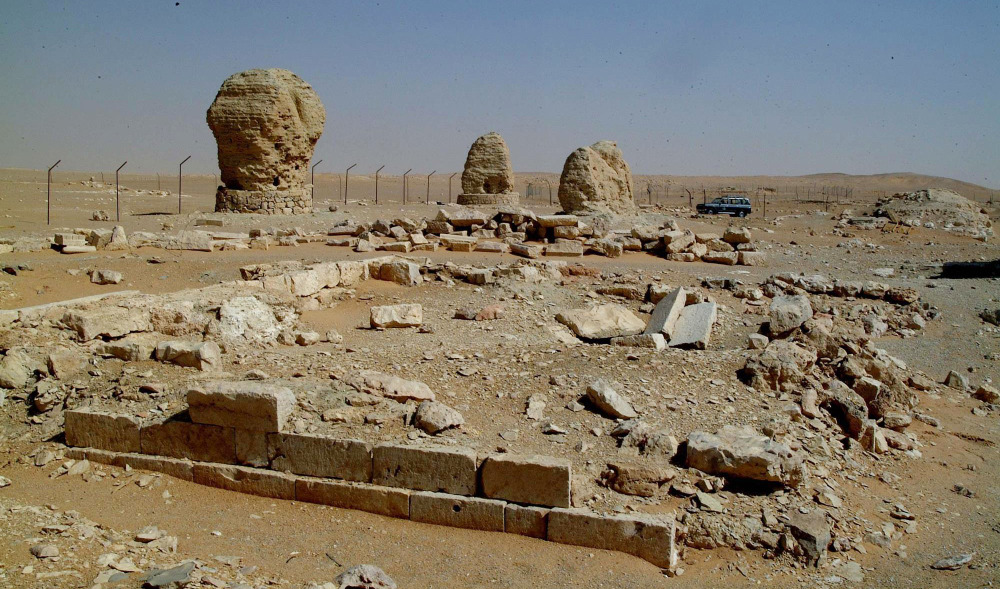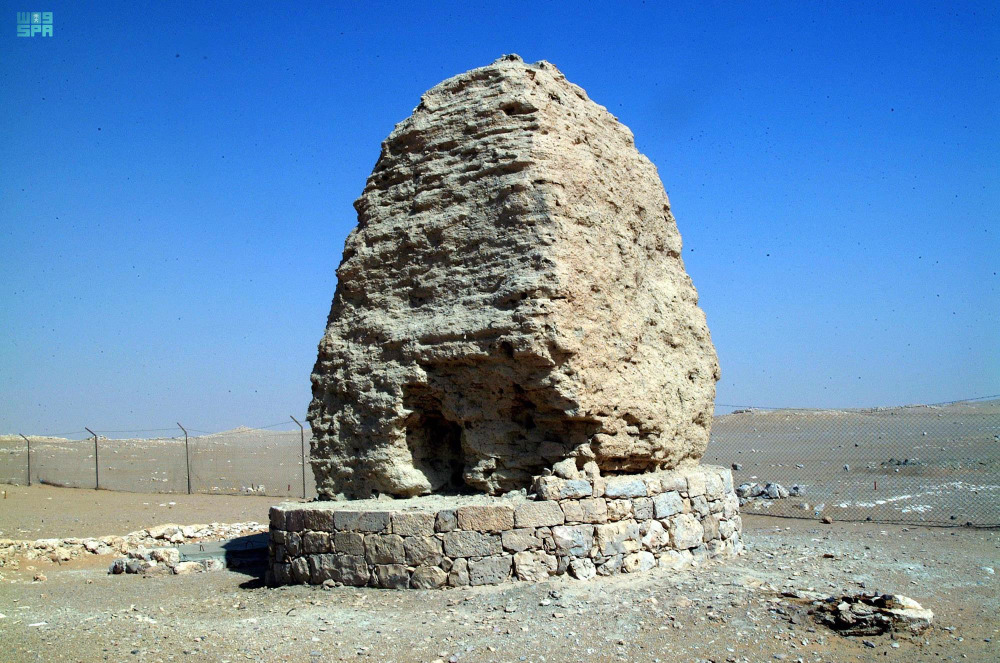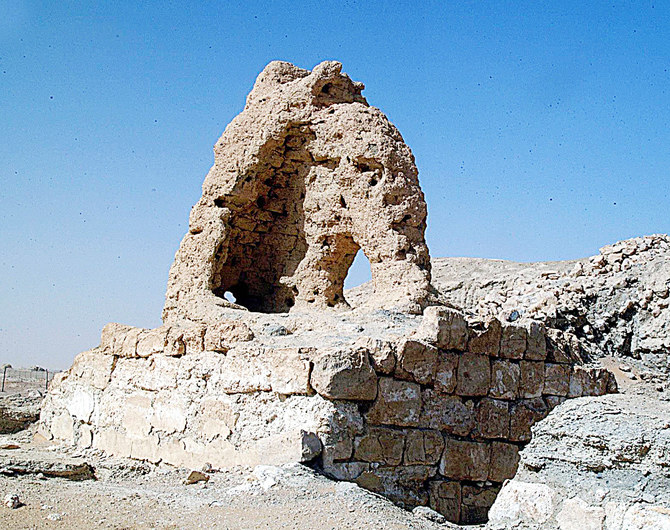Qaryat Al-Faw, the first capital of the Kindite kingdom, witnessed the establishment of several ancient civilizations, with its plethora of tombs depicting their presence and passing.
There are three types of cemeteries that can be distinguished in Al-Faw. The first is located on the western edge of the city and consists of the collective family cemeteries that belonged to those of heightened political and social status in the city.
The tomb is 5 meters deep, 1 meter wide, and 6 meters long from north to south. There are holes on the eastern and western walls in which a person could put his legs to go into or out of the tomb.
In addition, there are four doors on the four sides. Three of these doors lead to caves carved in round shapes, while the western door leads to a built room tiled with white plaster and a lower room at the northern end which contains a pit containing valuable things belonging to the deceased.
The second type consists of the cemeteries of the noblemen, where the tomb consists of eastern and western rooms with a ditch in the middle that is three-and-a-half meters deep, with holes in the eastern and western sides for people to enter and exit the tomb.
The third type of cemeteries belonged to the common people of the various kingdoms. They are located to the northeast of the city, on the edge of the western valley in the plaster area that lies to the north of the market. The cemeteries are strikingly similar to Islamic cemeteries. These tombs are composed of an irregular and un-plastered ditch between 1 and 5 meters long and ends with a tomb closed with a small clay board, which is similar to those used in the village buildings. Excavators found several jars among the dead upon opening them.
Al-Faw is considered as one of the most important archeological sites in the Arabian Peninsula. It boasts special importance due to its geographic location as a commercial center and a crossroads for caravans loaded with minerals, grains and weavings.
It was a major transit point for the caravans coming from the kingdoms of Sheba, Ma’in, Qataban, Hadhramout and Himyar on their way to Najran, Al-Faw then to Al-Aflaj and Yamamah before heading east to the gulf and north to Mesopotamia and Syria.
The tombs can be found about 150 km from the headquarters of Wadi Al-Dawasir governorate from the southeast, specifically in the area where Wadi Al-Dawasir overlaps with the Tuwaiq Mountains in an area called “Al-Faw.”
ThePlace: Qaryat Al-Faw, the first capital of the kingdom of central Arabia
https://arab.news/868zn
ThePlace: Qaryat Al-Faw, the first capital of the kingdom of central Arabia

Saudi Arabia marks UN’s World Day to Combat Desertification and Drought

- Event aims to spotlight urgent need to address growing challenges
JEDDAH: Saudi Arabia has marked the UN’s World Day to Combat Desertification and Drought, an awareness event held annually on June 17.
The day aims to spotlight the urgent need to address the growing challenges of land degradation, desertification and drought.
The Ministry of Environment, Water and Agriculture said the event emphasized the importance of land restoration as a driver of opportunity, the Saudi Press Agency reported.
It helps to raise awareness of the critical role healthy ecosystems play in creating jobs, enhancing food and water security and strengthening economic resilience, the ministry added.
It also highlighted Saudi Arabia’s diverse geography and climate which is home to a unique biodiversity adapted to a range of climatic conditions.
The Kingdom has launched several major environmental initiatives, most notably the Saudi Green Initiative, which aims to plant 10 billion trees over the coming decades.
The Kingdom is currently implementing 86 initiatives and programs with total investments exceeding SR705 billion ($188 billion), covering all aspects of the green economy.
These initiatives align with the core objectives of the SGI: reducing carbon emissions, expanding national afforestation, and protecting terrestrial and marine ecosystems.
More than 313,000 hectares of degraded land across the Kingdom have now been restored, and 115 million trees planted.
MEWA has also launched the Environmental Awareness Initiative, which is designed to raise environmental literacy and support Sustainable Development Goals.
The plan also emphasizes the importance of community engagement and cross-sector collaboration — from public institutions to private and non-profit entities.
As part of its efforts to monitor marine habitats, the ministry has conducted extensive field surveys along the Red Sea coast, covering over 600 coral reef sites, 200 seagrass locations and 100 mangrove areas.
According to UN data, desertification, land degradation and drought remain among the most pressing environmental challenges today, impacting up to 40 percent of the Earth’s land surface.
As the UN Decade on Ecosystem Restoration (2021–2030) reaches its midpoint, there is a critical need to accelerate restoration efforts on a global scale.
If current trends continue, the world will need to restore 1.5 billion hectares of land by 2030, creating a restoration economy valued at over $1 trillion.
The planet is currently losing healthy land at a rate equivalent to four football fields per second.
Hajj Ministry suspends 7 Umrah firms over transport violations

- Ministry took regulatory measures against the violating companies, suspending their operations and liquidating their bank guarantees to cover alternative transport costs
JEDDAH: The Ministry of Hajj and Umrah recorded violations by seven Umrah companies due to deficiencies in providing transport services to pilgrims, as stipulated in their approved programs.
It is part of the ministry’s efforts to enhance service quality for pilgrims and visitors of the Prophet’s Mosque, ensuring compliance with contracts in line with Saudi Vision 2030, which aims to improve the pilgrim experience at every stage of their journey.
The ministry took regulatory measures against the violating companies, suspending their operations and liquidating their bank guarantees to cover alternative transport costs for affected pilgrims, ensuring services meet approved standards.
It highlighted its commitment to protecting pilgrims’ rights and providing services of the highest quality and professionalism.
The ministry also highlighted its zero-tolerance approach to negligence or breach of contractual obligations, the Saudi Press Agency reported.
It called on all Umrah companies to strictly adhere to approved regulations and deliver services according to designated schedules, ensuring quality and the comfort of pilgrims and visitors during their stay in the Kingdom.
Al-Urumah seasons draw more than 1m ecotourists

- Over four seasons, Al-Urumah has grown into a vibrant destination, attracting more than 1 million ecotourists
RIYADH: The Al-Urumah Season, held in the heart of the desert at the Imam Abdulaziz bin Mohammed and King Khalid royal reserves, has become a premier ecotourism initiative, showcasing the Kingdom’s stunning environment and the passion of its organizers.
Over four seasons, Al-Urumah has grown into a vibrant destination, attracting more than 1 million ecotourists, according to a recent report from the Saudi Press Agency.
The inaugural season had about 52,000 visitors, rising to 230,000 in the second season. With eight service providers, the third season exceeded 300,000 attendees.
The fourth this year drew more than 400,000, reflecting effective strategic planning and infrastructure development involving the private sector and local communities.
During the Al-Urumah Season, the Imam Abdulaziz bin Mohammed Royal Reserve Development Authority offers 13 activities across both reserves, including camping, hiking, camel riding, cycling, stargazing, and other outdoor pursuits.
Additionally, 358 eco-units have been established for visitor accommodation, the SPA reported.
The authority also organizes training workshops for service providers on ecotourism principles, responsible recreation, and wildlife interaction, emphasizing their vital role in delivering quality tourism experiences.
The Al-Urumah Season has become an “integrated model of sustainable ecotourism.”
The authority has blended ecotourism, entertainment, and nature conservation, aligning with Saudi Vision 2030’s goals of economic diversification and community empowerment.
Saudi matchmaking app, Awaser, is helping individuals find partners by bridging tradition and modernity

- Alolayan said: “The younger generation increasingly wants to take ownership of their marriage journey in terms of to get
JEDDAH: With digital innovation taking place at a rapid pace, Awaser, a mobile application developed in Saudi Arabia, is at the forefront of a quiet transformation in the Kingdom’s matchmaking traditions.
It offers a modern approach to marriage, but remains firmly rooted in cultural and religious values.
Founded by psychiatrist Dr. Mohammed Alolayan, Awaser is not just a dating platform but a dedicated space for individuals and families with the intention of forming lasting marriages.

With features tailored to Saudi Arabia’s cultural norms and a strong emphasis on privacy, the app introduces a respectful and structured alternative to traditional matchmaking.
Speaking about the inspiration behind creating the first app of its kind, Alolayan said: “As a trained psychiatrist, I’ve spent years exploring human psychology and understanding the deep emotional challenges people face, especially in midlife, around intimacy and the question of ‘Who should I be with?’
“Listening to countless stories from patients and online followers, I realized how difficult it is for many to find a suitable partner within the traditional framework. That’s what inspired me to create Awaser.”
HIGHLIGHTS
• Awaser gives users the tools to search based on preferences unique to Saudi society, including regional origin, family background, education, sect, and tribal affiliation.
• This approach blends technology with cultural traditions, creating a platform that speaks to both the younger generation and their families.
Unlike typical matchmaking apps that rely on algorithms to suggest potential partners, Awaser gives users the tools to search based on preferences unique to Saudi Arabia society, including regional origin, family background, education, sect, and tribal affiliation.
This approach blends technology with cultural traditions, creating a platform that speaks to both the younger generation and their families.
Alolayan said: “Awaser does not offer matchmaking in the conventional sense. Instead, it elevates traditional matchmaking by making it more accessible and efficient.

“It’s a platform that respects Saudi customs while empowering individuals and families to make informed choices.”
One of the app’s most distinctive features is the ability for families to create and manage accounts on behalf of their children, a model that preserves the essence of traditional matchmaking while increasing the chances of finding a suitable match.
This family-first approach has resonated strongly with conservative users seeking to maintain trust throughout the process.
The app operates on a paid subscription model, which Alolayan believes ensures the quality and seriousness of its community. “We implemented a payment wall to ensure serious participation and prevent random or unserious users,” he said.
“Trust is crucial. That’s why users must verify with a Saudi mobile number and OTP (One-Time Password), and all communications are encrypted and automatically deleted after 30 days of inactivity.”
Privacy is a key concern for users in Saudi Arabia, particularly when it comes to online interactions between men and women.
Awaser addresses this by giving users complete control over their profiles and conversations, with no human intervention from the app’s management team. Conversations cannot begin without mutual consent, and all user data remains private and protected.
The platform currently focuses on Saudi nationals and residents, and has already had impressive engagement, especially from well-educated individuals.
“Around 30 to 40 percent of our users hold advanced degrees such as master’s or PhDs. While we expected high participation from major cities, we were pleasantly surprised to see users from nearly every region of the Kingdom,” he said.
Among the many success stories shared by users, one stands out for Alolayan: “A couple who met on Awaser married about a year and a half ago, and they recently welcomed their first child.
“Hearing that directly from them was incredibly moving, it validated everything we’ve been working toward.”
In a culture where family involvement remains a cornerstone of the marriage process, launching a technology-driven platform presented unique challenges. But the public response, Alolayan said, has been overwhelmingly positive.
“There’s a clear need, and many people are ready to embrace technology, so long as it honors our values. Awaser allows them to do both.”
Umm Abdullah, a user of the app, said: “As a mother, I’ve seen how difficult it’s become to find suitable matches, and approaching someone as the bride’s parents is not very common in our culture, we usually wait for proposals to come.
“Apps like this give us the chance to actively search instead of just waiting. It feels more efficient, while still respecting our values.”
Interestingly, Awaser also provides a space for non-traditional introductions between individuals, allowing for more autonomy in the relationship-building phase.
This dual approach supporting both traditional and independent searches reflects the evolving preferences of younger Saudis who want to play a more active role in choosing their life partners.
Alolayan said: “The younger generation increasingly wants to take ownership of their marriage journey in terms of to get to know their future partner before traditional steps begin.
“Awaser arrived at just the right time to meet this shift. It offers an alternative that feels modern yet grounded in cultural values.”
Another user, Naser Al-Rahman, said: “It’s really hard these days to find a relationship that leads to something serious. Most platforms don’t feel safe or genuine.
“But with this app, I feel like I can search more conveniently and securely, knowing the people here are serious about marriage.”
Although Awaser does not currently employ artificial intelligence to match users, Alolayan is open to future possibilities. “There is no proven psychological model for perfect matchmaking, which is why we don’t claim to match people ourselves.
“But I do see potential for AI and data analytics to provide smarter tools in the future, based on long-term user behavior.”
As Saudi Arabia continues its Vision 2030 journey toward modernization and empowerment, platforms such as Awaser highlight how digital solutions can coexist with tradition.
Commenting on the legal and cultural implications of matchmaking platforms, family lawyer Hassan Al-Ghawi said: “Apps like these help bridge the gap between tradition and technology.
“As long as user privacy is protected and the legal framework is respected, they can serve as a positive and legitimate extension of traditional matchmaking.
“Today’s younger generation often rushes into relationships, so involving both parents and children in the process allows for deeper understanding and more thoughtful decisions, potentially leading to stronger, longer-lasting marriages and fewer divorces.”
Deaf artist breaks barriers with solo debut in Jeddah

- Elham Abu Talib shares vision through her expressive works
JEDDAH: “It’s never too late to follow your dream,” says Elham Abu Talib, who has held her first solo exhibition in Jeddah after 38 years.
The Saudi artist is no stranger to the local art scene, having taken part in exhibitions across the Kingdom and overcome the barriers accompanying being severely deaf.

And at the Saudi Arabian Society of Culture and Arts in Jeddah on Sunday, Abu Talib showcased more than 40 paintings to leading artists and lovers of the genre.
Titled “Inspiration,” the exhibition marked a milestone, presenting her work to the public while highlighting her artistic journey amid years of persistence.
HIGHLIGHT
Abu Talib hopes to represent the Kingdom in international competitions. She also hopes the arts society will continue supporting disabled and female artists by providing platforms for their creativity.
Her passion began in childhood, when natural talent blossomed into fine art shaped by a beautiful dream. She lost her hearing as a child and faced speech difficulties, but met her challenges with patience, courage, and ambition.
Determined to express herself, she used a brush and colors as her voice — turning her childhood dreams into vivid reality.

She shared that hearing loss kept her from entering university, but her late father convinced her it did not mean giving up her ambitions.
Inspired by his words, she began participating in exhibitions while raising her children and fulfilling her duties as a mother.
She believes her disability has sharpened her visual perception — a gift she channels into her art.
“I’m so happy that, after 38 years, my dream has come true with this solo exhibition,” she said. “I thank the Saudi Arabian Society of Culture and Arts in Jeddah for giving me this opportunity.”
Abu Talib hopes to represent the Kingdom in international competitions. She also hopes the arts society will continue supporting disabled and female artists by providing platforms for their creativity.
Maha Abdulhalim Radwi, secretary-general of the Radwi Art Prize, said the artist had finally achieved a major milestone, adding: “This event allowed her to showcase her unique perspective and creative talent to a wider audience, proving that art transcends communication barriers.”
Mohammed Al-Subaih, the director general of the SASCA, said Abu Talib had dreamed of a solo exhibition for nearly four decades — and was now finally living that dream.
He added: “She’s participated with us in many workshops and group exhibitions; now it’s time to celebrate her first solo show.
“She deserves all the support and encouragement.”




















